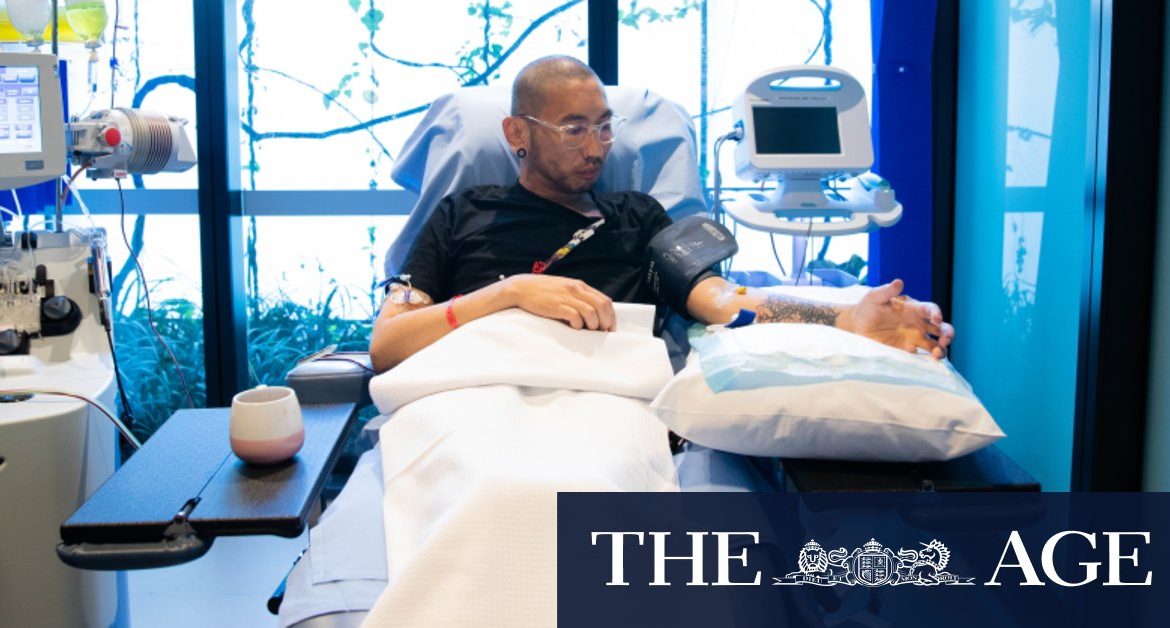Since February, Mr Abu Jalil’s body has shrunk to 42 kilos, more than half his weight a few months earlier. His temperature spiked past 40 degrees daily.
His hands and elbows were covered with necrotising skin lesions, called Gottron papules, causing black and painful sores on his hands and elbows which ulcerated. His lungs rapidly deteriorated. He crashed in the intensive care unit and was resuscitated, more than once.
When he arrived from a country hospital, he was critically ill and “looked awful”, said Dr Girgis. “He was sweating, in pain. He was confused by how unwell he was,” she said.
In the midst of a pandemic, which prevented family or friends from travelling to be with him, he has lost his job as a construction engineer in Melbourne, his visa status is uncertain and he became homeless after his lease ended on an apartment in Victoria. He came to Australia to earn money to support his family in Malaysia, he said.
Khaidir Abu Jalil at the Kinghorn Cancer Centre at St Vincent’s Hospital where he is receiving treatment for MDA5, a rare and severe autoimmune disease. With him are registrar Dr Logan Gardner and rheumatologist Dr Laila Girgis. Credit:Janie Barrett
By the time Mr Abu Jalil arrived at St Vincent’s Public Hospital in July, he had been without a diagnosis since he first became ill in February. Doctors had feared he may have an infectious disease.
He had been transferred from two hospitals in succession, Leeton District and St Vincent’s Private Community Hospital in Griffith, because of his deteriorating condition.
Working with other experts in the hospital, Dr Girgis diagnosed Mr Abu Jalil as having a rare autoimmune disease, called dermatomyositis. “He had low oxygen levels, couldn’t breathe and had to be intubated in ICU,” she said.
Dermatomyositis is rare, but the Malaysian man also tested for a worse variant. He was antibody positive for MDA5, which rapidly scars the lungs. It reduced the risk of his survival to about 50 per cent over six months.
Nearly six months after his admission, he is recovering and staff are optimistic.

Khaidir Abu Jalil, a patient at St Vincents Hospital fighting a rare disease.
During his time at St Vincent’s, he would cry and get sad. He never complained, though, which impressed staff who treated him. Doctors, who were the same age as their patient, said they were shocked by his appearance, only for Mr Abu Jalil to reassure them “I am a fighter”.
When he doesn’t want to face the world, he pulls a blanket over his head, said Amanda McLaughlin, a clinical nurse consultant. She has become close to him during nearly 40 plasma exchanges, during which his blood is washed and which take several hours.
Even when he was very ill, and had to tell his mother in Malaysia to prepare for the worst, Dr Girgis heard him say he was receiving the best of care. “The second time in intensive care, and we said he was critical, his mother cried when I spoke to her on her next-door neighbour’s phone,” said Dr Girgis. “But I was really impressed that even [then], he was reassuring his parents.”
When he arrived in Melbourne for work last year, Mr Abu Jalil said he had a very healthy life – he exercised, went to the gym and played golf. A “quiet reserved person”, he said he didn’t make many friends.
How did he keep going when he was so alone? Mr Abu Jalil responded by bringing out selfies of himself at his sickest.
“I don’t want to go like that again. To motivate [myself), I just look at the picture of me before. I just want a life. I saw my picture… I was very sick, very skinny,” he said.

Amanda McLaughlin attends to Khaidir Abu Jalil at the Kinghorn Cancer Centre at St Vincent’s Hospital where he is receiving treatment for MDA5 antibody positive dermatomyositis, a rare and severe autoimmune disease. Credit:Janie Barrett
Mr Abu Jalil deteriorated further when his rapidly deteriorating lung disease caused “white-out lungs”, said Ms McLaughlin.
Because of the immune suppression drugs he was taking, he contracted a fungal infection causing abscesses in his lung. When they did the plasma exchange, it made a remarkable difference, she said. “The chest was quite clear.”
For a man so alone when he arrived, he has made friends throughout the hospital. Every day staff detour from other parts of the hospital to say hello or bring treats. A former patient busted him out for a barbecue one day, which pleased him but worried his doctors.
Loading
Little piles of sweets, Turkish delight and bright red Lindt balls, appear as if by magic on his bedside table. When staff discovered he had arrived with no clothes when he was admitted, they faced another problem. Unlike patients with families nearby, he had nobody to wash his clothes.
Mr Abu Jalil said he didn’t like to make a fuss, but wearing a hospital gown for six months had begun to “get old”.
Dr Girgis said “St Vincent’s family” was trying to manage the other problems that had mounted up in Mr Abu Jalil’s life while he had been sick, including an unpredictable visa status and lack of money.
His future is uncertain.
He is expected to be discharged in time for Christmas this week. He has only two weeks’ accommodation lined up in a homeless shelter, Tierney House, operated by St Vincent’s in Darlinghurst.
St Vincent’s hopes donors will support the ongoing cost of his immuno-suppressing drugs and other medications by donating to St Vincent’s Hope Healing and Humanity Fund.
Get our Coronavirus Update newsletter
Stay across the news you need to know related to the pandemic. Sent Monday and Thursday. Sign up here.
Julie Power is a senior reporter at The Sydney Morning Herald.
Most Viewed in National
Loading







